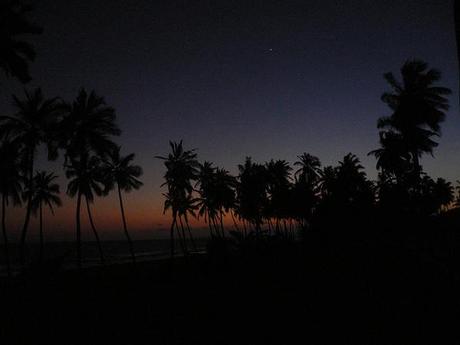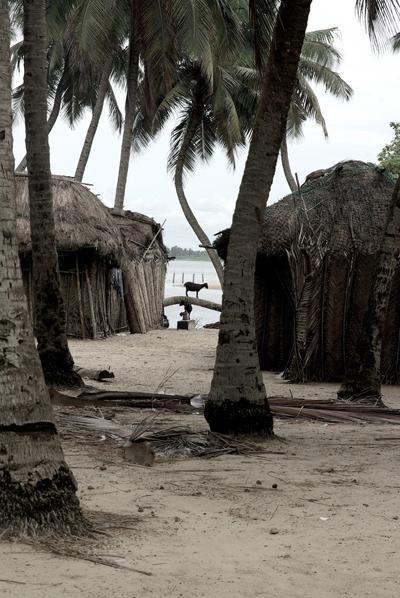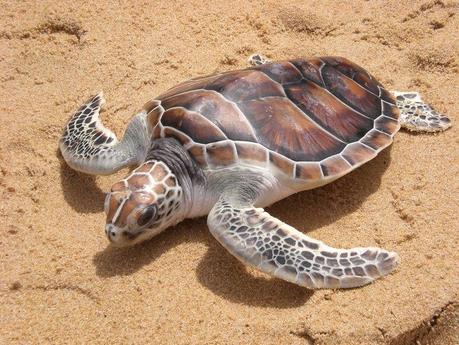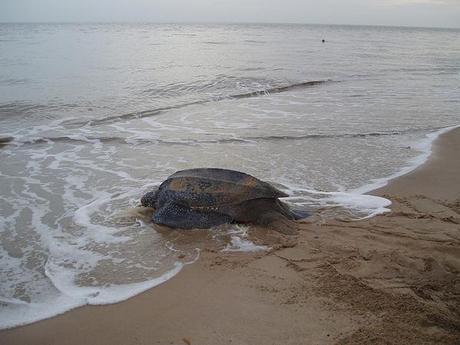Do you like adventures in the dark? Have you ever contemplated hanging out on an African beach at night?

As an expat and traveler, I’m not usually enthusiastic about going on excursions en masse with a group of others, but one time while living in Ghana, West Africa, my man and I signed up for a guided evening trip to the beach to watch one of Mother Nature’s great wonders. Well, that was the idea . . .
(This is an edited version of a story I posted several years ago.)
Crass Act
It’s Saturday night and thirty of us foreigners in a caravan of cars are on the way to the beach in the hope of watching the leatherback turtles lay there eggs. We’ve all brought food and wine to have a picnic first and fortify ourselves for the adventure. My love and I are in our own little rattle box of a Kia and our friend Mark is riding with us. Most of the road is a terrible stretch of potholes or just dirt and no pavement at all and we’re glad when the caravan comes to a stop. We all get out of our cars.
“We are here,” announces one of the local Ghanaian turtle scouts, his voice confident.
We see no here. We see no there. Barely visible are some shadowy coconut palms and several black pigs crossing the road in front of us. (No, I don’t know why black pigs cross the road.) Without electricity powering anything at all, dark is very dark.
People mysteriously emerge out of the nocturnal void and are standing around watching us. We can see the whites of their eyes and an occasional pale-colored piece of clothing. I did mention it was dark, did I not?
We’re informed that in order to get to the beach, we must hike through the village. The village headman has been located and a meeting is in progress, negotiations for passage through the hamlet, as well as for the recruitment of muscle to help us transport our picnic gear – baskets, and mats and coolers and chairs – to the beach. Needless to say, terms of agreement will include a monetary transfer for services rendered.
So we wait. Finally, negotiations successfully concluded, we safari on foot through the silent, shadowy village, a sliver of a moon the only light apart from our flashlights. Strapping young guys carry our gear on their heads, you know, like porters in Out of Africa.

Photo © Julien Simery
As Ghanaian villages go, this is a large one; it takes us at least seven minutes to trek through it to the beach. We hear the waves, big, noisy Atlantic Ocean waves, so we know we have arrived.
We arrange our blankets, mats and beach chairs. Open come the coolers. We share our goodies – gourmet stuff such as black caviar (left over from Mark’s Russian party last week), a selection of cheeses, smoked fish pâté, homemade lemon bars, and death-by-chocolate brownies, wine and other delectables. The entire village population materializes out of nowhere and gathers around to watch this decadent spectacle. Pretty embarrassing, come to think of it, all that conspicuous and copious consumption.
The food consumed, the turtle gurus give us their little spiel. We are all going on an expedition along the beach to a place that’s supposed to be a prime nesting site. Our possessions will be guarded by people from the village. Two of the three guides will strike out a little ahead of us, and if they spot a leatherback female laying eggs, they’ll flash their torch three times. We will then approach quietly. No talking. No flashlights, please.
Replete with food, sluggish with wine and dripping with sweat we slog through the sand in dead darkness, looking for signs of turtle life. I see nothing. From the invisible vastness comes the roar of the surf, but I can’t even see the waves.

Photo © Kuenzlen | Dreamstime.com
My mate asks if the local people will catch and eat the turtles or the eggs.
“Oh no!” says the pundit adamantly, “that is taboo!” No eating of turtle, no eating of eggs. Like we believe this. He talks some more about the nests, which are abandoned by the turtle moms once the eggs are laid and covered up with sand. The nests, however, are often disturbed by dogs and birds who will make a meal of the eggs.
“Do people search for the nests and eat the eggs?” I ask innocently.
“Oh, yes,” says he, “it’s a delicacy.”
Gotcha! is what I want to say, but don’t. There is the official pitch, and then there is the truth that sometimes slips through.
We trudge on, peering into the black yonder, hoping to see the scouts’ flashlights. Nothing. The air is balmy with a touch of humid. I’m lying. It’s muggy and clammy and sweat drips down my back and chest. Clearly, it takes sacrifices to see one of nature’s great wonders.
It’s been well over an hour now and we feel more and more like the Israelites wandering the dessert, schlepping ourselves endlessly through the sand, seeing no flashing lights in the distance, only darkness. No turtles in sight. Hopelessness and despair sets in and I pray to any deity who’ll listen that it’s not going to take forty years before we return to the land of caviar and wine.
Finally the turtle experts gather us around and regretfully inform us that they’ve spotted no tracks indicating that the big mamas have come ashore to reconnoiter the area. Signs of such exploration normally mean that the massive reptiles have retreated into the sea to return later in the night with all their sisters in tow for the egg-laying orgy. Since no tracks have been discovered, no leatherbacks are expected later.

Disillusioned and exhausted, we drag ourselves back to camp, where we crash, have a cold drink, pack up our stuff and safari back through the slumbering village, which is even darker and quieter than before.
Then we hear music. Drumming! Singing! It perks me up immensely. We see a light, an oil lamp, and a small group of people gathered in a compound. Maybe the villagers are trying to cheer us up, us being so disappointed and all.
But no, this is not the case.
Somebody has died. It’s a wake.
Past more huts we plod, seeing a goat, a dog, a few curious children. The men guarding our vehicles are sound asleep on mats. We pack everything into our cars and pay dash money to the porters who happily wave us farewell.
Off we go, back down the washboard road, rattling our little Kia and our kidneys. “I wouldn’t mind doing this again another time,” says my man to my surprise. “But minus the picnic.”
“Why?” I ask, yawning. “It’s fun eating on the beach.”
“It’s obnoxious for a bunch of obrunis to sit around gorging food with all these poor village people watching on. It’s insensitive. It’s a disgusting spectacle.”
What can I say? The man is right.

It could have been a snake, coiled on my pillow.
Photo © Tim Little

